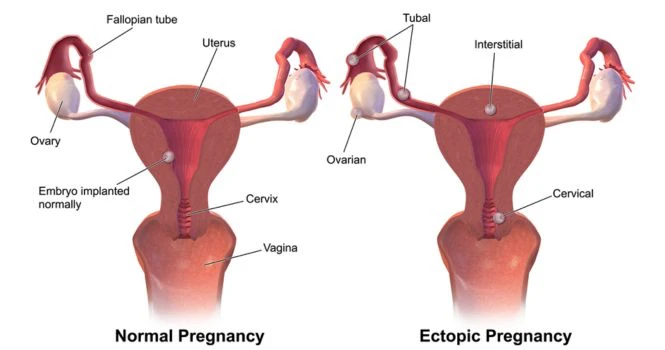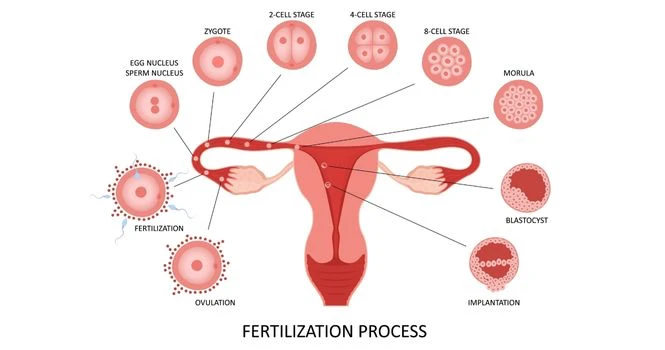Every pregnancy journey is unique and filled with its own joys, challenges, and learning curves. Unfortunately, not every pregnancy follows the expected path. An Ectopic Pregnancy is a medical condition where a fertilized egg implants outside of the uterus. It is a serious and potentially life-threatening situation that requires immediate medical attention.
Let’s look into the details of ectopic pregnancy, from its causes and symptoms to diagnosis and treatment.
What is an Ectopic Pregnancy?

An ectopic pregnancy occurs when a fertilized egg implants itself outside of the uterus, usually in one of the fallopian tubes, which carry eggs from the ovaries to the uterus. This is why ectopic pregnancies are sometimes called ‘tubal pregnancies’.
Although the fallopian tubes are the most common location for an ectopic pregnancy, the fertilized egg can also implant in the ovary or cervix. Wherever it occurs, an ectopic pregnancy can’t proceed normally and the growing tissue may cause life-threatening bleeding if left untreated.
What Causes an Ectopic Pregnancy?
The exact cause of an ectopic pregnancy isn’t always clear, but it often occurs due to a condition that blocks or slows down the movement of a fertilized egg through the fallopian tube to the uterus.
This could be due to a number of factors:
Inflammation and Scarring of the Fallopian Tubes: Conditions such as pelvic inflammatory disease (PID), often resulting from sexually transmitted infections like chlamydia or gonorrhea, can cause inflammation and scarring in the tubes.
Previous Ectopic Pregnancy: If you’ve had one, you’re more likely to have another.
Surgery: Any surgery on the fallopian tube, including sterilization procedures, can lead to blockages.
Birth defects or abnormal growths: Some women are born with abnormal fallopian tubes or develop abnormal growths later.
Recognizing the Symptoms
In the early stages, it might not cause any noticeable symptoms. As the pregnancy progresses, however, women may experience a range of symptoms including:
- Abnormal vaginal bleeding
- Lower abdominal or pelvic pain
- Sharp, crampy pain on one side of the lower abdomen
- Dizziness, weakness, or fainting (a sign of blood loss)
Any woman who may be at risk of an ectopic pregnancy experiencing such symptoms should contact a doctor immediately.
Diagnosing an Ectopic Pregnancy
They are usually diagnosed within the first few weeks of pregnancy, often before the woman realizes she’s pregnant. If an ectopic pregnancy is suspected, doctors usually begin with a pelvic exam to check for pain, tenderness, or a mass in the abdomen.
You may also have a pregnancy test and ultrasound. A blood test that measures the level of the pregnancy hormone (hCG) can help to determine if the pregnancy is ectopic, as often the levels are lower than expected, as in quantitative tests.
Treating an Ectopic Pregnancy
It requires immediate treatment. The options depend on the early diagnosis and the woman’s physical condition.
Treatment may involve medication, typically methotrexate, which stops cells from growing, allowing the body to absorb the pregnancy tissue and prevents further growth.
In other instances, surgery might be required to remove the ectopic tissue and possibly repair or remove the affected fallopian tube.
The Road to Recovery
Recovering from an it can be physically and emotionally challenging. Most women will need to take it easy for a few weeks as they recover, and they might need support and counseling to deal with the loss of pregnancy.
While having an ectopic pregnancy can increase the risk of having another one, many women can have a successful pregnancy in the future. Regular prenatal care can help ensure that any future ectopic pregnancies are detected early.
Conclusion
While an ectopic pregnancy can be a daunting and traumatic experience, understanding its causes, symptoms, and treatments can help women seek timely help and recover from this life-threatening condition.
Regular medical care and early pregnancy tests are key to early diagnosis and effective treatment.
It’s essential to seek medical advice and lean on your support network, like family and friends or professional counseling during recovery.













